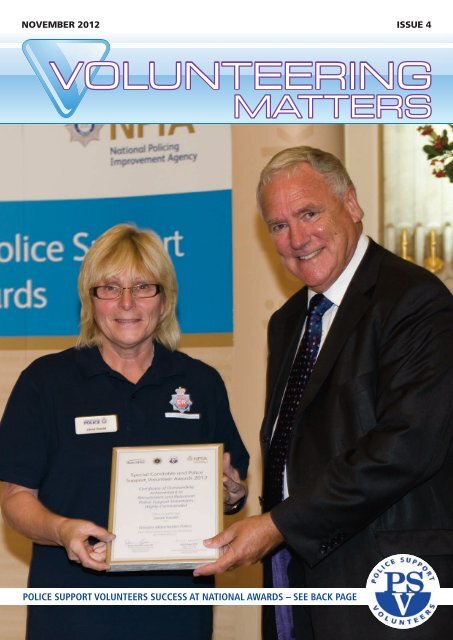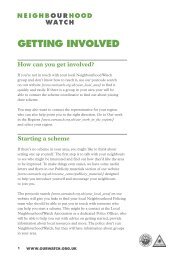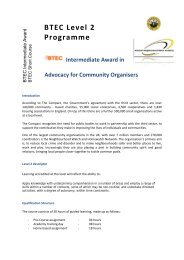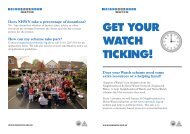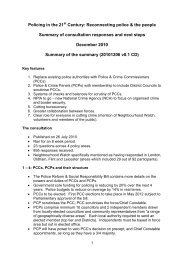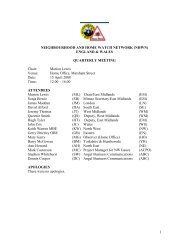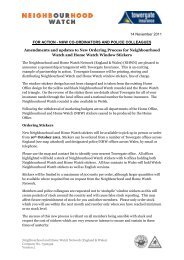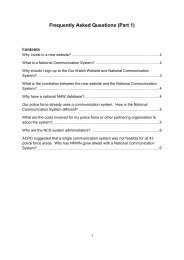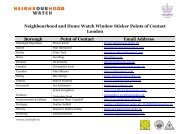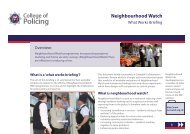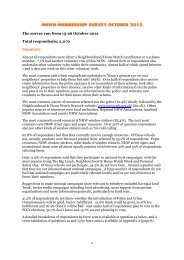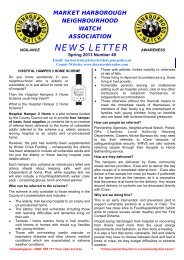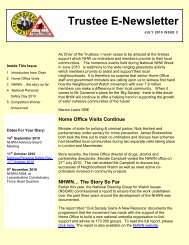Volunteering Matters - Neighbourhood Watch
Volunteering Matters - Neighbourhood Watch
Volunteering Matters - Neighbourhood Watch
Create successful ePaper yourself
Turn your PDF publications into a flip-book with our unique Google optimized e-Paper software.
NOVEMBER 2012 ISSUE 4POLICE SUPPORT VOLUNTEERS SUCCESS AT NATIONAL AWARDS – SEE BACK PAGE
WELCOMEfrom the EditorWelcome to Issue 4 of<strong>Volunteering</strong> <strong>Matters</strong><strong>Volunteering</strong> has been verymuch in the news this summerwith the volunteer contributionto the London 2012 Olympics.As always I am in awe of the sheer commitment thatvolunteers give – and give they did to London 2012. WhenI was watching the closing ceremony, I felt it was totallyjustified that the biggest cheer was for the Olympicvolunteers.Our country would not be the same without volunteers.Some of our own police volunteers were Game Makers andyou can read Dara Ley’s account of participating in London2012. Let’s hope that this summer has gone a long way toshow others how volunteering can really change the worldwe live in.However it is important that organisations understand thatvolunteering isn’t “free” and that there is a need forinvestment , not just monetary investment, but time – timeto support and develop volunteers and ensure that thevolunteer programme is a professional and sustainable onethat recognises the value that volunteers can bring into thepolice service.What I like about volunteering is that it is open to all agesand this can be seen on page 9 with Scott who joined SalfordHomewatch at 17 years of age, and our article celebratingMargaret, Anne and Frank’s 90th birthdays – thesewonderful volunteers have together given 15 years ofvolunteering to the police service which was not onlyacknowledged by their force, but also with a letter from thePrime Minister David Cameron.I hope you enjoy this issue and, as always, I welcome yourfeedback and contributions.Tina SheltonEditor, <strong>Volunteering</strong> <strong>Matters</strong>Please send your views, ideas and articles totina.shelton@gmp.pnn.police.ukA NEW VIRTUALEXPERIENCE FORVOLUNTEERMANAGEMENTOne of the platforms that can be used to encourage debate and developmentin volunteer management is a webinar session. Warrington Voluntary Actionhost these regularly and they provides an opportunity for volunteer managersto get together virtually to share ideas and learn more about the profession.Tina Shelton, VM’s editor attended the webinar; ‘It takes a whole organisation– Educating up and out for involving volunteers‘which took place on 4th July.“In this special webinar broadcast, we explored how it takes a whole organisation to involve volunteers and what this reallymeans for the role of volunteer management.” Tina went on to say “Usually, the webinar takes place on-line, however on thisoccasion, it was attended by volunteer managers across Warrington in person whilst the live webinar on line session took placeto mark the occasion of a very special guest speaker, Susan J Ellis. Susan is the founder of www.energizeinc.com and is one ofthe leading thinkers, writers and speakers on volunteering and volunteer management. This was a great opportunity forpeople working with volunteers to learn, connect and gain inspiration for you and your role, and for those in the room anopportunity to meet Susan in person”The webinar broadcast explored how it takes a whole organisation to involve volunteers and discussed what this really meansfor the role of volunteer management.The webinar covered:-• How we can identify and work to our strengths as individuals• Understanding that we are leaders and show others the way• Being specific about the support we need from our organisations• Developing our role as educators and advocates• Strategically influencing to get others on boardhttp://www.warringtonva.org.uk/You can watch the webinar in full, previous webinarsare also available on WVA’s YouTube channelhttp://www.youtube.com/user/VMmovement
<strong>Volunteering</strong> <strong>Matters</strong> asks Dara Leyfrom Cumbria Constabulary to reporton her experience as Games Maker atthe 2012 Olympics.“After two years of applications,interviews, training and a lot of waiting,back in May I finally got confirmationthat I was going to work at theOlympics. When I got the email I waslucky enough to be sitting in a barsurrounded by friends, so an ideal placeto begin celebrating and planningsummer 2012, safe to say I had a badhead in the morning.My Gamesmaker role was as a volunteerjust like being a Special Constable andinvolved working on the Guest Passcheck-in desk inside the London 2012Athletes Village, where I was welcomingthe guests of the delegations,International Olympic Committee andof the athletes. Even though it was achallenge to find accommodation andfigure out how to tell work I wanted yetanother summer off, I committed to 4and a half weeks unpaid work. Thisincluded 8:30 to 16:00 shifts Monday toFriday, which unfortunately meanthaving the joys of London transport atrush hour.My first day as a Gamesmaker was oneof the main highlights of the whole 4weeks. That morning my jaw droppedwhen Dame Kelly Holmes rolled up atmy desk requesting her guest pass!Even though she wasn’t competingshe was still buzzing with excitement,we had a quick ‘crack’ then she headedoff to give Ryan Giggs and the restof the GB footballers an inspirationaltalk. However I can’t say that I hadthe same experience with Tessa Jowell,MP, after me and her had slightdifference of opinion, but that’sanother story altogether! The first daywas pretty relaxed meaning I hadplenty of opportunities to snooparound the village and get plenty ofphotos.Over the four weeks I saw andexperienced some of the best bits of theOlympics and of London. Highlightswould definitely include holding a goldmedal, meeting Greg Rutherford, BorisJohnson and Clive Woodward, alsosoaking up the fantastic atmosphere inthe Olympic Park. It allowed me to workalongside and interact with people fromthe majority of 205 countries takingpart, which was one of the unexpectedbonuses of working at the Olympics andalso means I now have plenty ofcontacts for future travels.As fun as it was I couldn’t wait to arriveback to the lakes and mountainsbreathe in some fresh air and relax inmy own bed.”Met Police Volunteers have pulled out all the stops to help ensure the smooth running of the Met's Olympic operationsAn unexpected influx of more than 450 officers to the mutual aid accommodation centre at Imperial College meant it was allhands to the deck as the volunteers stepped up to assist MPS staff in processing all the officers.The officers had arrived later than expected as they had been registering their firearms at the armoury. The volunteers, whosemain role was originally to assemble and distribute welcome packs, showed considerable flexibility by switching to checking theofficers into the centre and answering phones. They then ensured the officers were in the right place in time to receivetheir first briefing.Deborah Wales, accommodation officer at ImperialCollege, said: "With the large numbers of officersarriving at once, we were unable to deal with thisinflux as all staff were fully deployed. The volunteersstepped in and provided an amazing response, actingprofessionally and calmly ensuring that officers fromoutside London received a smooth arrival."Darren Sheridan, Head of Met Police Volunteers, said:"Over 400 of our 1500 Met Police Volunteerssupported mutual aid accommodation centres andmuster briefing deployment centres across Londonduring the Olympic and Paralympic Games. Staff andofficers alike commented on how friendly andhardworking the volunteers have been, providinginvaluable support at a critical time. Theirprofessionalism and dedication enhances and adds valueto the work of MPS officers and staff, and I would like tothank them for all their efforts during this busy time."VOLUNTEERING MATTERSTWO
GUEST ARTICLE - CLEVELANDJunior <strong>Neighbourhood</strong> <strong>Watch</strong>-A Special InterestBy Karel Simpson, Special SuperintendentLet’s go back to basics, as all serving regular policeofficers, specials and pcso’s are aware that catchingoffenders of crime ties up a tremendous amount ofmanpower, time and resources to achieve a satisfactoryprosecution of those persons who committed the crime.Crime prevention if applied correctly can reduce the effortand time involved to reduce the level of crime. WithinCleveland police, Stockton District have had a Crime andSafety initiative which has been running for the past fewyears called Junior <strong>Neighbourhood</strong> <strong>Watch</strong>. This is targetedtowards Primary schools, with the age range of childrenbetween 8 to 11 years, with the intention of giving goodcitizenship skills and crime prevention knowledge to thepupils before going on to secondary school. We all knowpeer pressure can turn young minds and naive heartsturning them to committing low level crimes and oncestarted is not easy to stop which is why early interventionis vital.When JNHW first started in 2009, it was run by a volunteercivilian co-ordinator who was later privately funded by theschools taking part and a local housing group who werehaving problems with youngsters in and around theirhousing premises; Although the main driving force wasfrom Cleveland Police, the fire brigade, RNLI and localauthority were the only agencies involved. I arrived on thescene 2 years ago and offered my services to join JNHWfrom the Special Constabulary and policing side.Initially, I was just going into the 8 Primary schoolsonboard the scheme at that time and gave aseries of talks on the history of the police service and thespecial constabulary. It soon became apparent from thefeedback that a little extra input was needed due tokeeping the level of interest from the children going. Istarted going into schools with full uniform and explainingwhat equipment and clothing we have to carry and wearto fulfil our role, the personal safety, law training bothSpecials and Regular officers have to attend to enablethem to enforce dealing with all aspects of the problemsthat could be encountered .The children were mostenthusiastic and would ask very educated questionsregarding the role of a police officer. At the end of eachsession I would ask the children to forma line and let them feel the weight of allthe equipment carried on the bodyarmour so that they were aware of whatthis felt like when being worn. Toconclude I would emphasise that it isbetter to listen and do what the policeoffice says and not to argue as this is oneof the most common causes that results inarrests being made of young people. Apossible result of this could be a courtcase, conviction, criminal record and thatwhen applying for any job later in life theywould have to disclose that informationon the job application. This could make thedifference between successfully achievingthe job that they desire or not.As time went on my involvementincreased as more schools subscribed tothe scheme. In some weeks I wasattending four schools after the nornalschool day had finished as the JNHWgroups are normally held from 3.15pmuntil 4.30pm. We now have 19 schools inthe Stockton district taking part andTHREE
A local magistrate has now joined the teambringing a different prospective to enforcewhat the children learn in the after schoolactivities about crime and the results it canhave on peoples lives. As part of thispartnership the magistrate has organised visitsto the local courts where the children act out ascenario of a crime with each child having apart to play. I also attend to show the childrenwho are playing the police, crime and forensicofficers how to present their evidence in thewitness box correctly.partly due to the success of theproject I have been moved to take command of thespecials in Hartlepool, and have been tasked by the T/ACCto become involved with the Primary schools in Hartlepooldistrict, with a view to the scheme being implmentedthere.The JNHW Co-ordinator I work with has managed to bringother agencies into the Stockton scheme including Tristarhomes who have funded some of the events and trips thechildren have attended. They have also supplied anemployee who gives a puppet show with themes inconnection with anti social behaviour, graffiti etc that thechildren can relate to. The NHS Ambulance service havealso been into schools and carried out CPR and heart starttraining at an appropriate level for the childrens agerange. Other interesting events for the children havebeen visits to the stables where the police horses arekept, the Cleveland police helicopter when operationalrequirements allow have visited schools, talks by Transportpolice on the dangers of going onto rail lines, this isimportant as Cleveland has a close rail network bothindustrial and urban.One of the most interesting visits we take thechildren on is to Safetyworks at Benwell,Newcastle. This is in a building run by theNorthumbria Fire brigade, St John Ambulance,Police and Local athority. There are a number ofscenarios set up relating to the dangers childrenwill come across in their everday lives. Theseinclude dangers in the home from fire,electricution, drowning in a pond in the garden,outside a road/street scene with a crossing, cornershop, hole in the wall, and a police office completewith a custody cell. There is also a metro station to showthe dangers that can be present at any rail station.My input deals with the road/street scenario, where Iexplain about the dangers when crossing over the road,the use of light controlled crossings and lollipop crossings.The dangers of vehicles stopping and them being asked toget into the vehicle by someone they do not know, andwhat to do in that event.I use the corner shop to illustrate how easy it is forthem to be asked to join a gang by stealing somechocolates from inside without paying. As theycome out of the shop I arrest them for theft and takethem to the police station, charge them at thecustody desk and they are then placed in the cell. Inaddition I now use the ‘hole in the wall’ as a danger as theage limit is now 11 years to hold a card. I explain thedangers of muggings, pin and card fraud as well as cloningof cards.The results of the work carried out by allparties involved will not be known for someyears, as the children leave primary andenter secondary school, then college andfinally university. What is being tried herewill probably not affect the children whoare and always will be good, the main areais the children who are on the fence whocould go ether way, It will hopefully makethe children with attitudes from problemfamilies give them something to thinkabout before commiting any type ofantisocial crime.VOLUNTEERING MATTERSFOUR
SCHEME PROMOTESROAD, COMMUNITY& PERSONAL SAFETYTwo pupils from Neston Primary School have been crownedJunior Road Safety and <strong>Watch</strong> Officers of the Year, withpupils from Rossmore Primary in Ellesmere Port receivingHighly Commended awards.Over the past 12 months officers have kept special diaries torecord how they raised awareness of road, personal andcommunity safety in their individual schools.Leila Marshall and Emily Wollaston from Neston and OliviaMcCone and Shannon Ledwards from Rossmore have workedhard promoting road, community and personal safetymessages both in their schools and to the wider communityfor the past year.Head of Neston Primary, Rob Golding, received the JRS&WOshield, with Leila and Emily collecting a personalised shield,certificate and prizes presented to them by Cheshire West andChester Councillor Lynn Riley and Chief Superintendant PhilJones of Cheshire Constabulary.Olivia and Shannon were presented with highly commendedcertificates and prizes for their outstanding work.Chief Superintendent Phil Jones said ‘Year 6 children from 140West Cheshire Primary Schools take part in the Junior RoadSafety and <strong>Watch</strong> Officers Scheme every year undertaking ahigh calibre of work to raise awareness of road, personal andcommunity safety in their individual schools and the widercommunity’.“Both Councillor Lynn Riley and I would like to congratulateLeila, Emily, Olivia and Shannon on their success, which is theculmination of a very productive year in office by all thechildren.”Headteacher Rob Golding said: “Leila and Emily’s enthusiasmand commitment have been outstanding and the wholeschool community has benefited. They well deserve theirspecial award for a very active year’s work”.This is the first year of the newly revamped scheme thatChief Superintendent Phil Jones and Councillor Lynn Rileyand winners of the JRS & WO Shield, Leila Marshalland Emily Wollaston from Neston Primary SchoolChief Superintendent Phil Jones and Councillor Lynn Rileyand Olivia McCone and Shannon Ledwards fromRossmore Primary School who presented with thehighly commended certificateincorporates safety messages from Cheshire Constabulary,who are now working in partnership with the Council’s Safeand Sustainable Travel Team, to promote various aspects ofsafety to primary school children by Year 6 pupils.Every year two pupils are nominated to promote road,community and personal safety within their school. Their roleentails reading out special safety messages during assemblies,organising competitions and updating the JRS & WO NoticeBoard.WORK EXPERIENCE STUDENTSIn the photo is Wirral Crime Scene Investigator Angie Merchant,who explained fingerprint procedures to the group.The group pictured came from 5 different Wirral Schools, withone student who is currently studying Criminology atStirling University.MERSEYSIDE POLICE IS SPLIT INTO 6 BASIC COMMAND UNITS,THE WIRRAL BEING ONE OF THEM.Each BCU has an Extended Police Family Co-ordinator whoamongst other things is responsible for recruiting and retainingPolice Support Volunteers, and Volunteer Police Cadets. Oneof the co-ordinators tasks is to ensure that a varied weeks workexperience is offered to local students in the areaCarolyne Hankey, Extended Police Family Co-ordinatororganised for the Wirral students to attend a varied weekswork experience with the organisation. The students gave upsome of their school holidays to participate.Carolyne said “Whilst recently attending a school event, I wasapproached by parents of a young man who did not actuallyattend the school that I was at. They were concerned that theirson did not have a 'direction' to go in. I offered him a workexperience placement, which he accepted, and from that hehas been recruited as a Police Support Volunteer who will assistthe staff with the new intake of Police Cadets due in September 2012. Due, in the main to health and safety issues, all'training/insights' into the police is delivered inside. My colleagues from the following units assisted to make it a veryenjoyable week for the students:-Armed Response Unit, Searching techniques, Arson Reduction - Fire Services, Cannabis Farms, Police History Force ControlCentre, Murder Mystery exercises, Interviewing techniques, Roads Policing - Drink/Drug driving - Special Constables: therole of the volunteer Crime Scene InvestigationAll through the week, they had knowledge tests and interactive exercises - resulting in a formal presentation at the endof the week.”FIVE
GUEST ARTICLE - CUMBRIA FIRE & RESCUE SERVICECOMMUNITY VOLUNTEERSAlun James , Community Volunteer, Cumbria Fire & Rescue Servicetells <strong>Volunteering</strong> <strong>Matters</strong> about his volunteer role“I originally applied as a volunteer after seeingan advert in the Cumbria County Council freemagazine and have now been involved in a varietyof activities for the past four years. Because thereis such a wide group of people signed up asvolunteers, I’ve met new people from all over thecounty that I would otherwise never have had anycontact with. With such a variety of backgrounds,we represent a good range of the population of thearea with people from a range of ages, ethnicbackgrounds and disabilities, many of whomwouldn’t otherwise have any involvement with theFire & Rescue Service.We’ve been out and about all over the countywith the Firesafe campaigns, where the servicetargets a specific geographical area and utilises theFirefighters, staff and volunteers available to offerHome Fire Safety Visits, so that we can installsmoke alarms and provide guidance on what to doif there is a fire in the home. We’ve covered urbanareas where there is a lack of communityinvolvement and the rural out of the way parts ofthe county that don’t see much of anyone, least ofall the Fire Service. While we will always get somerefusals, the vast majority of householders arealways happy to see us andspare some time for a chat.Where there has been afire, we have also been ableto help with the AfterIncidence Response byassisting crews and staff byhelping with visitingresidents in the area andmaking them aware thatthey can get Home FireSafety Visits from theservice, while the incident is still fresh in theirminds.We’re also out at lots of community events topromote the service and are always getting peopleto sign up for smoke alarm visits wherever we go.Even when people tell us that they already haveworking smoke alarms in the house, when we aska little more we usually find that a visit is stillhelpful to ensure that the alarms are in the rightlocation and that they have a Fire plan in place,should the worst ever happen.With quite a number of the volunteerstrained as HeartStart Instructors, we’ve alsobeen getting out to various groups and clubsto provide the basic ‘emergency life support &CPR skills’ that HeartStart provides. Moreoften, it’s a case of instilling a level ofconfidence in people and demonstrating thatyou don’t have to be a Paramedic to have ago in an emergency whilst waiting for theemergency services to arrive. Those that wehave trained can see that we are no differentto them, which helps to pass on the message thatHeartstart promotes.Some volunteers have been involved with thePassplus Driver Training initiatives and RoadAwareness Training. Those involved have beenable to provide a very personal perspective basedon their own bereavement or involvement in anRTC (Road Traffic Collision) which brings home theroad safety message to the younger generation.With Sellafield in the county, we also had theopportunity to get involved in the OSCAR 9exercise that simulated a nuclear emergency there.Helping to set up and administer the RegistrationCentre, some of us also volunteered to be“potentially contaminated” individuals at Sellafielditself and got to go through the de-contaminationprocess. Luckily the water in the showers was hot!The volunteers appealed to me because it gaveme the opportunity to expand on my skills and bepart of a public facing organisation. What I didn’trealise was that I was also able to pass on a lot ofknowledge and experience that I have gained overthe years to new volunteers joining our team.Equally, I’ve learnt a lot of new skills and got toknow a lot more about the people and the area.I’ve had the opportunity to drive around in theservice vehicles and towour mobile football cageand climbing wall for someof the youth events thatwe’ve been involved with.Again, this gave us theopportunity to get directlyinvolved with parts of thecommunity who wouldn’tsee the Fire Service in such alight. Through thisinvolvement, I hope thatwe’ve shown the service in apositive light and have also had a few people thinkabout signing up as volunteers and Firefighters.With the number of people that we now havesigned up as volunteers, we are able to help outwith a variety of initiatives that we’re asked toassist with. In October, you can find us travellingaround the county collecting and dropping offelectric blankets for testing from vulnerable &elderly residents. We’ve been involved with somebusiness events where we have approached smallbusinesses with information about their legalobligations in relation to fire safety. And we aresigned up as volunteer helpers if there is ever aneed to ferry flu drugs around for those that mayneed help with any imminent Swine Flu pandemic– we’re still waiting for that to happen.Other initiatives and events we have beeninvolved with have been partnerships based withorganisations such as Cumbria <strong>Neighbourhood</strong><strong>Watch</strong>, Cumbria Police, Housing / Social Landlords/ Inspira etc, these can vary enormously from givingleaflets out at a small event to raising awarenessof community fire safety at really big multi agencyevents where everybody works together topromote a safer & stronger Cumbria. These eventsare really enjoyable because you get to learn lotsmore and meet many new people.Recently some of our volunteers have beentrained as Restorative Justice ConferenceFacilitators working alongside Cumbria Police &Probation Services offering victims & offenders anopportunity to be involved in Restorative Justicepractices which means directly engaging theaffected parties in a face to face restorativemeeting. This is believed to have most impact forboth victim and offenders, allowing a victim theopportunity to challenge and understand the crime/ harm and ensuring the offender learns about theimpact of his / her behaviour and has theopportunity to repair some of the harm caused.We get a really good response from all the staffin the service and it makes us feel appreciated andinvolved in all the events that we attend. Theyprovide us with an insight into all of the work theydo and give the younger volunteers who arehoping to join as Firefighters something to aim for.The training that we have received and theopportunities to be involved in all the activities thatthe service offers does make all of us feel that weare part of something really worthwhile that makesa real difference to the lives of the people ofCumbria.”For further information about Cumbria Fire &Rescue Service Community Volunteers, pleasecontact Valerie Ayre on 07769 614561 orvalerie.ayre@cumbria.gov.ukVOLUNTEERING MATTERSSIX
Police Chaplaincy Service<strong>Volunteering</strong> <strong>Matters</strong> is pleased to welcome Keith Hitchmanfrom Merseyside, who talks about the Chaplaincy ServiceChaplains make regular visits to stations and places of work. Aspart of the pastoral care package we offer a 'Listening & CoachingService', as well as support for retired officers.As a Chaplaincy we seek to engage with policing and justiceissues where appropriate. In May, together with 'Riverforce'(Merseyside Police Christian Support Network), we hosted apanel discussion on the theme of 'Restorative Justice – Does itwork?'Chaplains also act as important community bridge-builders,helping to connect Merseyside Police with local churches,minority religious communities and community agencies.Four of the Merseyside Police Chaplaincy Team is also StreetPastors with the Liverpool City Centre Street Pastors project.Street Pastors is a national Christian charity working with thePolice and Local Authorities in deploying teams are volunteersinto the night-time economy to help with pastoral issues whichmight arise on the streets.Likewise the Chaplaincy has been involved in organising a seriesof church-based meetings across Liverpool in support of the ChiefConstable's 'Relentless' campaign against gang and gun crime inthe city and region.My name is Keith Hitchman and it is my privilege to lead theMerseyside Police Chaplaincy Service.Formed in July 2011 at the request of Chief Constable JonMurphy, the Merseyside Police Chaplaincy team is made up of12 volunteer Chaplains, nine of which are local religious leadersand three serving police officers. The service is also multi-faith,and includes a Muslim and a Jewish chaplain, as well asChaplains representing Roman Catholic, Anglican, Free andIndependent church traditions. Committed as we are to diversityand inclusion, there is a Chaplain dedicated to this task.Our primary purpose to ‘provide personal, practical, andspiritual care' for all staff, irrespective of religious affiliation orcommitment. To this end there is a chaplain for each BasicCommand Unit. Each Chaplain commits to a minimum of 8hours per month as a volunteer. In achieving these aims we workclosely with the various Staff Support Networks offered byMerseyside Police.In addition to pastoral care we offer operational support as andwhen required, responding to major incidents when called upon.The Chaplaincy service has been warmly received by MerseysidePolice. In the words of Superintendent Rowley Moore of theMerseyside Police Community Engagement Team “MerseysidePolice's recognition of the need for a chaplaincy service isto be applauded and wholeheartedly embraced. PersonallyI am excited, humbled, energised and delighted with theintroduction of chaplains. They provide much neededspiritual and practical support and truly understand whatit means to be an individual within Merseyside Police.”Revd. Keith HitchmanPioneer Minister, Diocese of LiverpoolForce Chaplain, Merseyside PoliceYou can also visit http://www.police-chaplains.org.uk/NACPationalssociation ofhaplains to theoliceSEVEN
Crimestoppers forging partnershipswith the police and rural communitiesOn March 23rd 2012, twenty ninerepresentatives of rural communities andbusinesses in Cumbria gathered at CumbriaPolice HQ at the invitation of the ChiefConstable and regional director ofCrimestoppers – rural crime being the priorityfor this charity in 2012. Delegates includedfarmers, agricultural suppliers, oil suppliers,Parish Councils and students from the localagricultural college.The objectives of the gathering were to;identify the crime and behaviour types that are of greatest concernto rural communities; what was already being done in theseregards, what works, what doesn’t work; identify ways in which thepolice, Crimestoppers and rural communities can add value existinggood practice without duplicating effort.The group identified a number of issues as being of primaryconcern to rural communities, some of which are high on the policeradar (Quad bike, tool, machinery, metal and fuel thefts; Cannabiscultivation) and others which maybe don’t get such a high profile,or ‘satisfactory’ response (Livestock thefts; Fraudulent insuranceclaims; Deer and Salmon poaching).There was recognition that there existed many good initiativestargeting rural issues, but participants identified some additionalways in which to get crime prevention messages across whilstengaging members of rural communities. These included;FARMWATCH OPERATION:On 30th May, twenty four farmers and representatives of the ruralcommunity assembled in Appleby police station at 8:30pm (NOT thesame people as in March). These individuals were allocated a policeradio (on restricted band) or mobile telephone, and allocated astrategic location at which to sit (using their own vehicles). Theywere instructed to report vehicle movements which were thenchecked out by operational police staff. The operation went on intothe early hours of the following days, and whilst only resulting inthe apprehension of some poachers that evening, the long termeffect has been the increase of ‘suspicious vehicle reports’ to theparticipating <strong>Neighbourhood</strong> Policing Team from two per week, totwo per day!SOCIAL MEDIA:Participants acknowledged the value, and limitations, of socialmedia as a medium for distributing crime prevention messages andengaging the public. One of the primary barriers to the positive useof social media is the limited capacity and skills set within thepolice.Participants at the meeting from the local college (who were on an‘armed services’ course, under 18 years and residents in ruralCumbria) volunteered their services to the police, all presentrecognizing that this generation have the desired skills andknowledge to use social media effectively. Plans are well advancedto recruit these individuals as Police Service Volunteers in a newspecialist role – Social Media support administrators.CRIME PREVENTION TEXT ON BUSINESS INVOICES:Timely reporting of crimes and incidents are critical to successfulpolicing and resolution of issues that cause concern to ruralcommunities. Alas, many people in rural communities observeincidents but don’t report them (evidenced by Farmwatch above!).Two businesses involved in the supply of agricultural goods tofarmers agreed at the event to include text on invoices sent tofarmers which is hoped will provide regular reminders of theimportance of doing so. The first invoices containing the text “FightCrime: Report suspicious activity to the police on 101”, will go outin July 2012.CCM Administrators – thehidden face of volunteering:Cumbria Community Messaging is the means by which the policeand partners communicate with watch groups in Cumbria. It is aninternet based service which is also open to none watch groupmembers to subscribe and receive crime and community alerts. ByJune 2012 there were over 5300 individuals registered on thesystem in Cumbria.Historically, the communication tool utilized for this purpose washoused on the police network. This restricted those registered on itto those the police chose to put on, and created a significantadministrative responsibility on the Constabulary.Cumbria Community Messaging is licensed to Cumbria<strong>Neighbourhood</strong> <strong>Watch</strong> Association, with Cumbria Police (and otherpartners) utilizing the system as ‘Information Providers’. This modelallows the police to communicate with those on the system (whochoose to allow the police to do so), without the administrativeresponsibility associated with being the license holder).In reality, the Constabulary and partners provide some adminsupport to the system, but given that the county <strong>Neighbourhood</strong><strong>Watch</strong> Association are the license holder, it allows them to provideadditional valuable support to the police by undertaking manyadmin tasks on the system.These include:• Adding users to the system• Responding to issues highlighted by users• Dealing with service users who have problems - changes ofmobile phone numbers or e mail addresses are identified by thesystem and sent to ‘Members with Communication issues’ foraction.• Helping ‘map’ schemes on the system and verify schemecoordinators.There are presently eleven Cumbria <strong>Neighbourhood</strong> <strong>Watch</strong>Association, police and partner agency volunteers withadministrator rights on the Cumbria Community Messaging. Thesevolunteers provide many hours of unpaid time, and immeasurablebenefits to the police, their partners and communities aroundCumbria.Further information can be obtained from Andrew.baines@cumbria.police.uk mobile: 07971140575VOLUNTEERING MATTERSEIGHT
GUEST ARTICLE - THAMES VALLEY POLICEBirthdays, Volunteers and David CameronTime constantly advances; it is oftenperceived as the older we get the less wewill do. That is a notion that has beenchallenged by three of our volunteershere at Thames Valley Police. MargaretHarrison, Anne Topham and FrankSteiner are 90 years old this year.Between them they have given toThames Valley police force almost 15years of volunteering, not to mentionthe 270 years of life experience whichthey bring to their roles.It was only proper to celebrate thisachievement and in time honouredtradition, they celebrated with cake. Onthe afternoon of the 26th of September2012 guests wereinvited along withtheir friends andfamily to celebratethe three eldestpolice supportvolunteers inThames ValleyPolice andprobably thecountry.The afternoon wasa rainy one, ourhonourednonagenariansand their guestsarrived to begreeted with white table cloths, tea,sandwiches and cakes. Julie Pink, thevolunteer development manager andguest speaker, welcomed all of them asthey arrived. The chatter built to theappropriate level and the party hadbegun.Richard Bennett, Assistant ChiefConstable in charge of the extendedpolice family, arrived. Another of theguest speakers he immediately set aboutthe important task of pouring tea for theguests. Sara Thornton, Thames ValleyPolice Chief Constable, then arrivedappropriately wearing, as she said ‘herparty dress’. She took time talking to allof the guests before she officiallywelcomed everyone and began thespeeches.Sara, Julie and Richard all spoke aboutthe gratitude Thames Valley Police haveto their volunteers. How they are part ofthe community we serve and how theyare an important part of the policingfamily. The speeches were finished witha letter sent by David Cameron to thevolunteers, in which he wrote:“Volunteers are the core of Britain’s civilsociety, an indispensable resource for thevoluntary sector and in many publicservices. I would like to take thisopportunity to recognise the outstandingwork that Thames Valley Policevolunteers do. A strong voluntary andcharitable sector is crucial to building abigger and stronger society. My vision forthe Big Society rests on the fact that inour communities there are individuals,like you, businesses and charities that areoften better placed to confront theproblems our country faces than theState. I want to take power out of thehands of bureaucrats and give it to thepeople working on the front line whoknow what is best for a service and whocan help us provide better services moreefficiently. I hope that you have anenjoyable day today and thank you againfor all your years of hard work.”SALFORD’S YOUNGEST HOME WATCH MEMBERScott may be a good thirty years younger than the averageHome <strong>Watch</strong> member but that hasn’t stopped him gettinginvolved and keeping his community safe.Nineteen-year-old Scott from Irlam joined the local Home<strong>Watch</strong> two years ago. He was convinced to join afterspeaking with PCSO Mark Fitzgerald and has got involved ina range of different tasks from leaflet dropping to helpingout at crime prevention days. He has also delivered apresentation to more than 50 members.Outside of Home <strong>Watch</strong>, Scott is a full time student and isplanning to go to University in September to study policing.He hopes to become a police officer in the future.PCSO Mark Fitzgerald said: “Young people aren’t usuallyinterested in joining home <strong>Watch</strong> because it seems oldfashioned and it isn’t ‘cool’ for young people to associatewith the police. However, Scott has proved what a massivedifference Home <strong>Watch</strong> can make.“Not only has he learnt new skills but he has helped thepolice gather intelligence and keep crime down and I’mreally grateful.“Home <strong>Watch</strong> in this area has been running for 10 years andis extremely successful. I appreciate the efforts not only ofScott but of every single one of our members. We couldn’tdo the job we do without them.”NINEScott said: “Young people aren’t usually interested in joiningHome <strong>Watch</strong> because it seems old fashioned but I reallyenjoy getting involved and giving something back to mycommunity.“I’m proud of where I live and want to make a difference.I’ve taken part in some great tasks and met the ChiefConstable when he attended one of our Home <strong>Watch</strong>meetings.“My friends and family have been really supportive and I’durge anybody, regardless of age, to get involved and helpmake their area a safer place to live.”
GUEST ARTICLEThis issue we hear from Marie HoldtVolunteer Manager for Contact The ElderlyFROM VOLUNTEERTO AMBASSADORBefore I became a Volunteer Manager I had onlyever volunteered once: collecting money for acancer charity in the pouring rain with my friend.It wasn't the rain that put me off. In fact I wasn'tput off at all - I just didn't know much aboutvolunteering or the opportunities available, anddidn't feel charities reached out and spoketo me.So when I first started as a Volunteer Manager Ireally didn't know much about volunteering orvolunteers and a question that kept popping intomy head was: Why do they give up their valuabletime?Being a Volunteer Manager is just like being a(nice) sales person. We sell an experience thatpeople (often) haven’t got access to otherwiseand we’re selling an opportunity to be part ofsomething.My marketing background told me I needed toget to know our volunteers. In my head I couldhear my old teacher say: “However unique eachindividual is there are always common traitsamongst people who do the same things or buythe same products. If you know what these areyou will be able to appeal to your target group,and have a better success rate in turning apotential customer into a buying customer.”Clever words. Applying the same logic to mywork I started asking myself questions such as:Who were they? How old? Working, studying orretired? Did they listen to the radio and read localpapers? How had they heard about us? And whydid they want to volunteer for us?With 100's of volunteers in my area, it would behard to ask each and every one of them, so I didthe first of many surveys asking the abovequestions plus many more. And the responseswere amazing! As were the snippets of extrainsight from comments to some of thequestions - all straight from the heart. All fromvolunteers wanting to help us do more of whatwe do.And it was this that got me thinking: Thevolunteers all love what they do for our charity.Maybe if they got a nudge they might tell otherpeople about it. And, more importantly, they maytell me how they think we can find morevolunteers.CHANGING OURMESSAGEAt the time we wanted to get more young peopleinvolved, so I asked some of the existing youngvolunteers to come in to the office one eveningafter work. With drinks and nibbles to keep themgoing, I asked our focus group why theyvolunteered for us, why they got involved in thefirst place and what kept them motivated.To my surprise their responses were very similar -and very different from the messages on ourpromotional material. For example, all of themmissed an older person in their life either becausetheir grandparents had passed away or becausethey lived far away. They also all enjoyed therelationships they had formed with the olderpeople, the stories they heard and the fact therewas room for real friendships to evolve.Our existing message said: ‘Volunteer drivers andhosts needed. A little time.. A lot of fun.. A lastingdifference’ accompanied with a picture of amature woman helping an older person. Nothingabout what we really do, the difference it makesto our older guests or what the volunteers getout of volunteering. No wonder we didn't attractthat many volunteers...So we set about changing the message on ourleaflets, posters and other promotional materialand as a result got many more younger peopleinvolved - and older too. The survey had in factrevealed no matter what age our volunteers werethey all enjoyed the core of what we do; therelationships they build with our older guests,and this was the new message we used.SUCCESSFUL SOCIAL MEDIAHowever, with this we still felt we could do more.The focus groups we had gave me the feeling thevolunteers really enjoyed talking about why theyvolunteer. They do something regularly,something they believe in, and something manyof their friends didn't always understand thereasons behind. Some of the volunteerssuggested we joined Facebook and promised theywould comment on our posts. As Twitter was juststarting out, we joined that too to see where thatwould get us.It took us some time to get the hang of it, anddecide on the message we wanted to get across.To begin with it was very slow, but soon ourvolunteers came forward and with just a littleencouragement from us (i.e. 'How wasyesterday's tea?') we got the most amazingresponses. And we still do, with more and morevolunteers joining the conversations every day.Our volunteers are sharing photos and stories,and promoting our charity in a way we couldnever do ourselves.VOLUNTEERSTURN AMBASSADORSJust like Volunteer Managers our volunteers sellthe charity every time they talk about it. And theydo it much better than us as it comes straightfrom their hearts, and they can use their personalexperiences. After all, research shows that we aremore likely to ‘buy’ a product that has beenrecommend by someone (even if we don’t knowthem) than after seeing an advert. This meansyou are now more likely to hear one of ourvolunteers interviewed on radio or TV than one ofmy colleagues.And yes, it is with fingers crossed that I listen,hoping the briefing I gave them worked. Hopingthey will get all our key messages across. But nomatter whether they do or not, they always getacross just how much they love theirvolunteering. Result: enquiries from potentialvolunteers and older guests are flooding in.Not wanting to just sit back and relax we cameup with another idea and asked all volunteers inan area to come together to tell us how theythought we could get to their employer. Couldthey open the door for us? Not just for donations,but helping us recruit their colleagues by puttingup posters at their work, writing about us ontheir intranet, or lending us a room free ofcharge, printing our annual report and accounts,help us with IT or campaigns. The answer: Yesindeed.It seems since we have stopped trying to thinkwhat messages might work to attract morevolunteers and supporters, and actually askpeople who are already involved for theirthoughts, we continue to increase the number ofvolunteers, which means we can help more olderpeople feel less lonely. Our volunteers haveturned into ambassadors, and although the termisn’t used formally it is a role they readily take on.www.contact-the-elderly.org.ukJoin us onFollow us onVOLUNTEERING MATTERSTEN
POLICE SUPPORT VOLUNTEERSRECOGNISED AT NATIONAL AWARDSOn 19 October successful nominees for the National Special Constabulary and Police Support Volunteer Awards were invited toThe Great Hall, Westminster, London to receive their awards from Lord Taylor of Holbeach, CBE, Parliamentary Under Secretaryof State for Criminal Information.Lord Taylor gave a keynote speech and also speaking at the ceremony were former NPIA Chief Executive Officer Nick GarganQPM and the Commissioner of the Metropolitan Police, Bernard Hogan-Howe QPM. The event was well attended with over 120police officers, staff, Special Constables, Police Support Volunteers and other members of key stakeholder groups present.There were 9 awards presented to Police Support Volunteers.NORTH WEST WINNERSAchievement in Recruitment& Retention – PSVsHighly CommendedPolice Support Volunteer –Individual AwardHighly CommendedJanet GouldGreater Manchester PoliceMartin CoyneGreater Manchester PoliceJanet took on the responsibility of arranging localrecruitment events to attract volunteers to Tameside.She marketed the opportunity in local press, radio andvia posters and ultimately interviewed all prospectivecandidates. Janet was instrumental in breaking theculture around acceptance of volunteers onher division.Martin has given his services to co-ordinatingBury Cadets, including the recruitment andobtaining funding and sponsorship for the scheme.Martin guides the cadets through first aid courses,charity work, helping the local community andworking alongside the NPT to deliver newslettersand make community contactOTHER WINNERSPolice Support Volunteer Individual Award – Winner Hilary Lester, Gwent PolicePolice Support Volunteer Individual Award – Highly Commended – Robert Stevenson, MetropolitanPolice Support Volunteers Team Award – Winner – Blaby District Volunteers, LeicestershirePolice Support Volunteers Team Award – Highly Commended –South Gloucestershire Volunteer Identification Witness ChaperonesPolice Support Volunteers Team Award – Highly Commended – Newquay Street Safe project, Devon & CornwallAchievement in Recruitment & Retention – PSVs – Winner - Sgt Ian Kennett, Avon & Somerset PoliceAchievement in Recruitment & Retention – PSVs–Highly Commended - Sgt Karl Faulkner, Warwickshire Police


